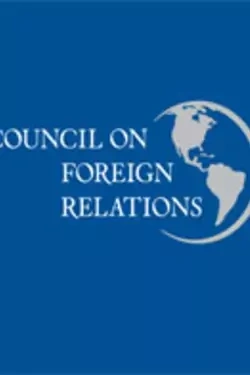Task Force Members:
J. BRIAN ATWOOD is Dean of the Humphrey Institute of Public Affairs at the University of Minnesota. He served as the Administrator of the U.S. Agency for International Development during the Clinton administration.
KENNETH H. BACON is the President and CEO of Refugees International. Between 1994 and 2001, he served as the Assistant Secretary of Defense for Public Affairs and Pentagon spokesman.
EDWARD P. DJEREJIAN is the founding Director of the James A. Baker III Institute for Public Policy at Rice University. He served as the U.S. ambassador to Syria and Israel and was Assistant Secretary of State for Near Eastern affairs between 1991 and 1993.
JAMES F. DOBBINS is the Director of RAND's Center for International Security and Defense Policy. He was Ambassador to the European Community (1991-93), Special Assistant to the President for the Western Hemisphere (1996-99), and Assistant Secretary of State for Europe (2001-02). He served as the Clinton administration's Special Envoy for Somalia, Haiti, Bosnia, and Kosovo, and most recently as the Bush administration's Special Envoy for Afghanistan.
BART FRIEDMAN is a senior Partner at Cahill Gordon & Reindel LLP and serves on the Brookings Institution's Board of Trustees.
CARL S. GERSHMAN has been President of the National Endowment for Democracy since 1984.
JOHN C. HULSMAN is a research Fellow in European affairs at the Davis Institute for International Studies at the Heritage Foundation. He also served as a Fellow in European studies at the Center for Strategic and International Studies in Washington and taught world politics and U.S foreign policy at the University of St. Andrews in Scotland.
JEANE J. KIRKPATRICK is a senior Fellow at the American Enterprise Institute and Professor Emeritus at Georgetown University. She served as U.S. Permanent Representative to the U.N. during the Reagan administration and was a member of President Reagan's cabinet and National Security Council.
ELLEN LAIPSON is President and CEO of the Henry L. Stimson Center. She worked on U.S. policy toward Iraq in the 1990s at the National Intelligence Council, the National Security Council, and the U.S. Mission to the UN. She served as Vice Chair of the National Intelligence Council from 1997-2002.
TOM MALINOWSKI is the Washington Advocacy Director of Human Rights Watch. Prior to joining Human Rights Watch, he was Senior Director for Foreign Policy Speechwriting at the National Security Council.
ROBERT A. MALLEY is the Director of the International Crisis Group's Middle East Program. He was on the National Security Council (NSC) staff from 1994 to 2001. He finished his tenure at the NSC as special assistant to the president for Arab-Israeli affairs.
PHEBE A. MARR is a leading specialist on Iraq and was a senior Fellow at the National Defense University .
EDWARD L. MORSE is senior Executive Adviser at Hess Energy Trading.
GREGORY S. NEWBOLD is the Executive Vice President and chief operating officer of the Potomac Institute for Policy Studies. A retired Lieutenant General, he was formerly the Director of Operations on the Joint Staff.
THOMAS R. PICKERING is a Cochair of the Task Force, and is also senior Vice President for International Relations at Boeing. His diplomatic career spanned five decades and included service as the U.S. Permanent Representative to the U.N. He retired from government in 2001 as Undersecretary of State for Political Affairs.
JAMES A. PLACKE is currently a senior Associate at Cambridge Energy Research Associates (CERA) and a nonresident senior Fellow at the Brookings Institution. Previously, he was Director for Middle East research at CERA.
JAMES R. SCHLESINGER is a Cochair of the Task Force, and is also the Chairman of the MITRE Corporation's board of trustees and is senior adviser at Lehman Brothers. He is also counselor and trustee for the Center for Strategic and International Studies and chairman of the executive committee at the Nixon Center. He served as secretary of defense and secretary of energy.
JOHN M. SHALIKASHVILI is a visiting professor with the Institute for International Studies at Stanford University. After the 1991 Gulf War, he commanded Operation Provide Comfort, the international mission that provided humanitarian assistance and protection to Kurds in northern Iraq. He retired from the U.S. Army in 1997, after serving as Chairman of the Joint Chiefs of Staff.
GORDON R. SULLIVAN is the President and COO of the Association of the United States Army (AUSA). He served as Cochair of the Commission on Post-Conflict Reconstruction, a joint project of the Center for Strategic and International Studies and AUSA. He retired from the U.S. Army in 1995, after serving as the Army's 32nd Chief of Staff.
F. J. BING WEST is the President of the GAMA Corporation. He is also a former Assistant Secretary of Defense for International Security Affairs and the coauthor of The March Up: Taking Baghdad with the 1st Marine Division, published in 2003.
FRANK G. WISNER is Vice Chairman of External Affairs at American International Group. Ambassador Wisner has served in a number of senior positions in the U.S. government, including Undersecretary of Defense for Policy from 1993 to 1994 and Undersecretary of State for International Security Affairs from 1992 to 1993.


 Online Store
Online Store